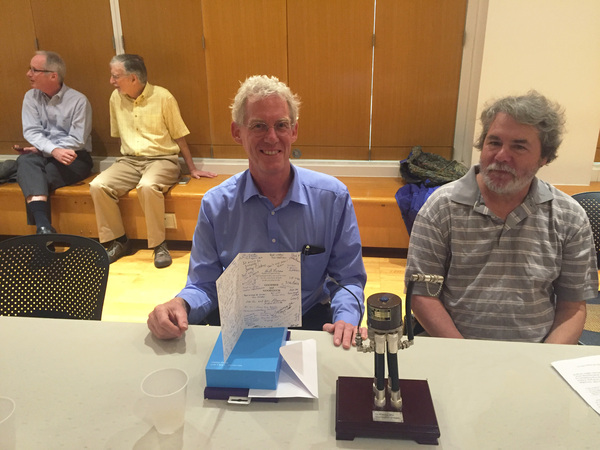CLASSE NEWS |
17 Oct 2017
CESR Specialist, John Sikora, to Retire

John Sikora at the All-CLASSE meeting where John was recognized for his many contributions to CESR and CLASSE
John Sikora is retiring on October 20th, 2017. After almost 30 years of working on CESR, John has been an integral part of the machine, CLASSE, and the community here at Cornell. He offered a few answers to help us understand some of his experiences here.
How long have you been working at the Laboratory?
I started in August of 1989 and have had the good fortune to work with some of the best people in the business. Raphael Littauer could do the most amazing things with the simplest circuits. Mike Billing has been my supervisor/mentor for just about all of my time at CESR, but I'm afraid I was only able to absorb a fraction of the things that tried to teach me. There are many others who taught me about software, accelerator physics, electronics, RF... it has been a humbling but educational experience.
What projects have you enjoyed the most while at CLASSE/Cornell/CESR & why?
The most enjoyable aspect of my time at Wilson Lab was my involvement in electron cloud measurements. There were two overall methods that I worked on. The first included a lot of back and forth between measurements and simulations that were being developed by Jim Crittenden. The other was a measurement technique that I developed with Stefano DeSantis who is at Berkeley. It was all hard work, but totally fun.
What are you going to miss about CLASSE/Cornell?
I'll certainly miss the people. But there are some things about the lab that I will NOT miss -- like the phone calls at 2am. Many years ago, I remember getting a call about the horizontal separators -- I think it was on my birthday, or 4th of July or something. The separators would get into a state where they couldn't hold high voltage and we didn't understand why. It is a very lonely feeling to be driving in to the lab when you don't know what's wrong and don't know what to do and there is a crowd of people waiting for you to "fix it". Separator repairs were long, tedious and only got them to work temporarily. In another few weeks the same separator would fail again. Eventually, we figured out that synchrotron radiation would make the freon reactive, which would attack the stainless steel, and the "rust" particles would coat the high voltage ceramics and clog the cooling system. Now we have a better freon filter.
What are you looking forward to in your next adventure?
My next adventure will be working at the Stanford Linear Accelerator (SLAC). They have a special program where they get old people to work on old equipment. I will be working at 75% -- semi-retired -- as I have been doing at Cornell for the past year or so. I will be living in Palo Alto and my plan is to bike to work. I will be living (finally) with my partner Gloria and spending less time on airplanes.
Congratulations John!

